Junior Resident Resume Examples

Jul 18, 2024
|
12 min read
Crafting Your Junior Resident Resume: Tips to Ace It Ready to begin your medical career? Learn how to write a junior resident resume that highlights your skills and experiences, making sure you stand out in a competitive field.
Rated by 348 people
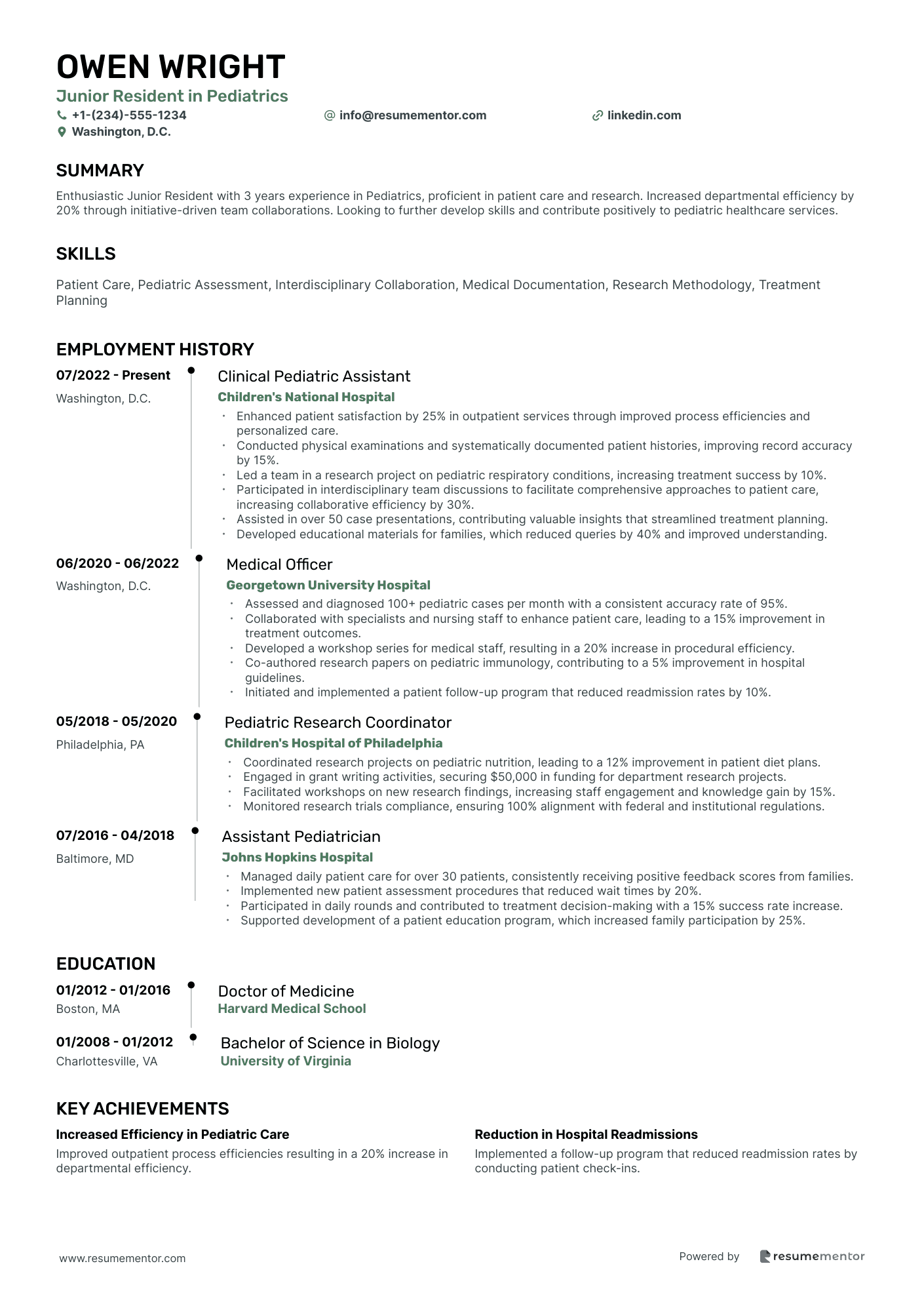
Junior Resident in Pediatrics
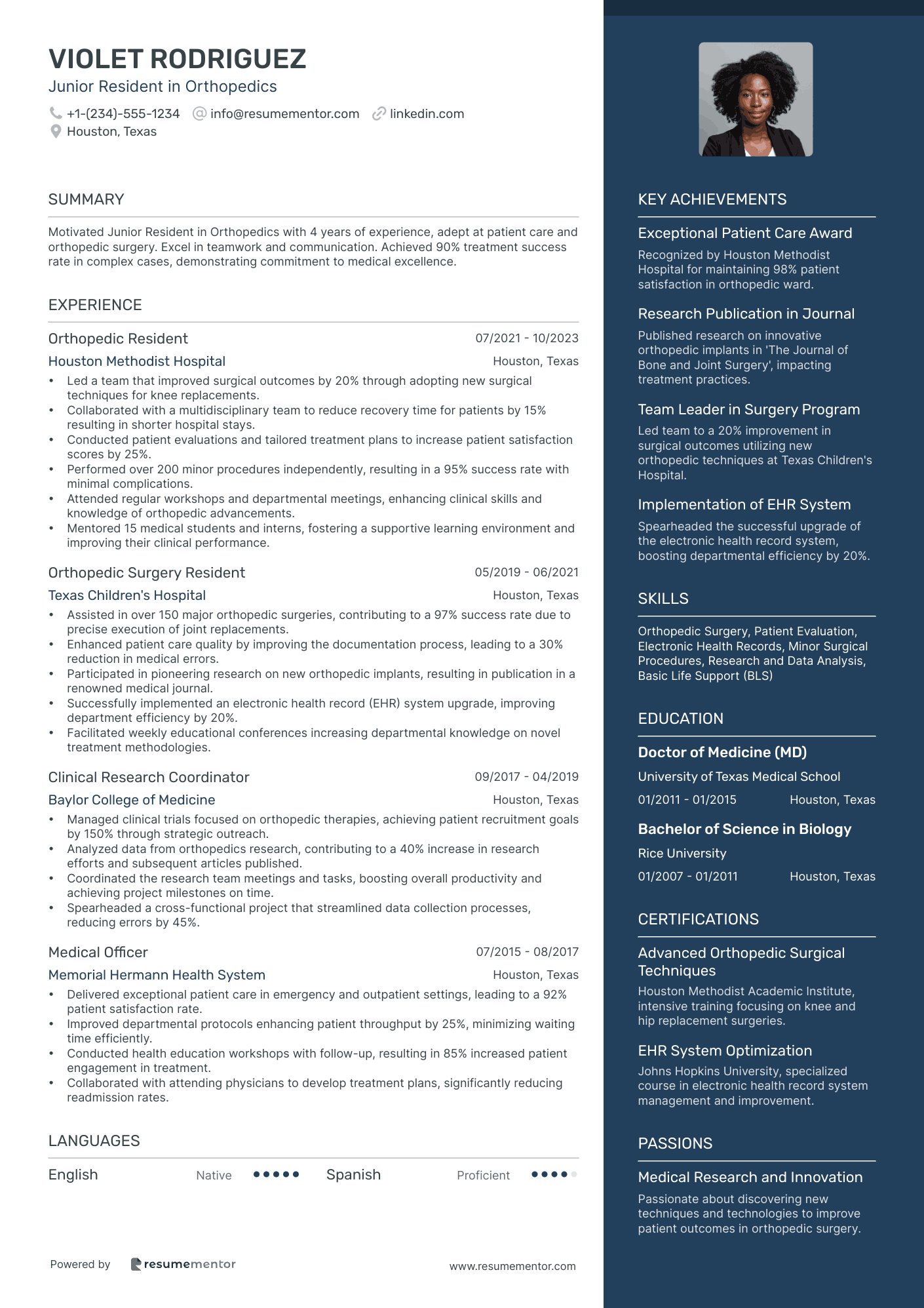
Junior Resident in Orthopedics
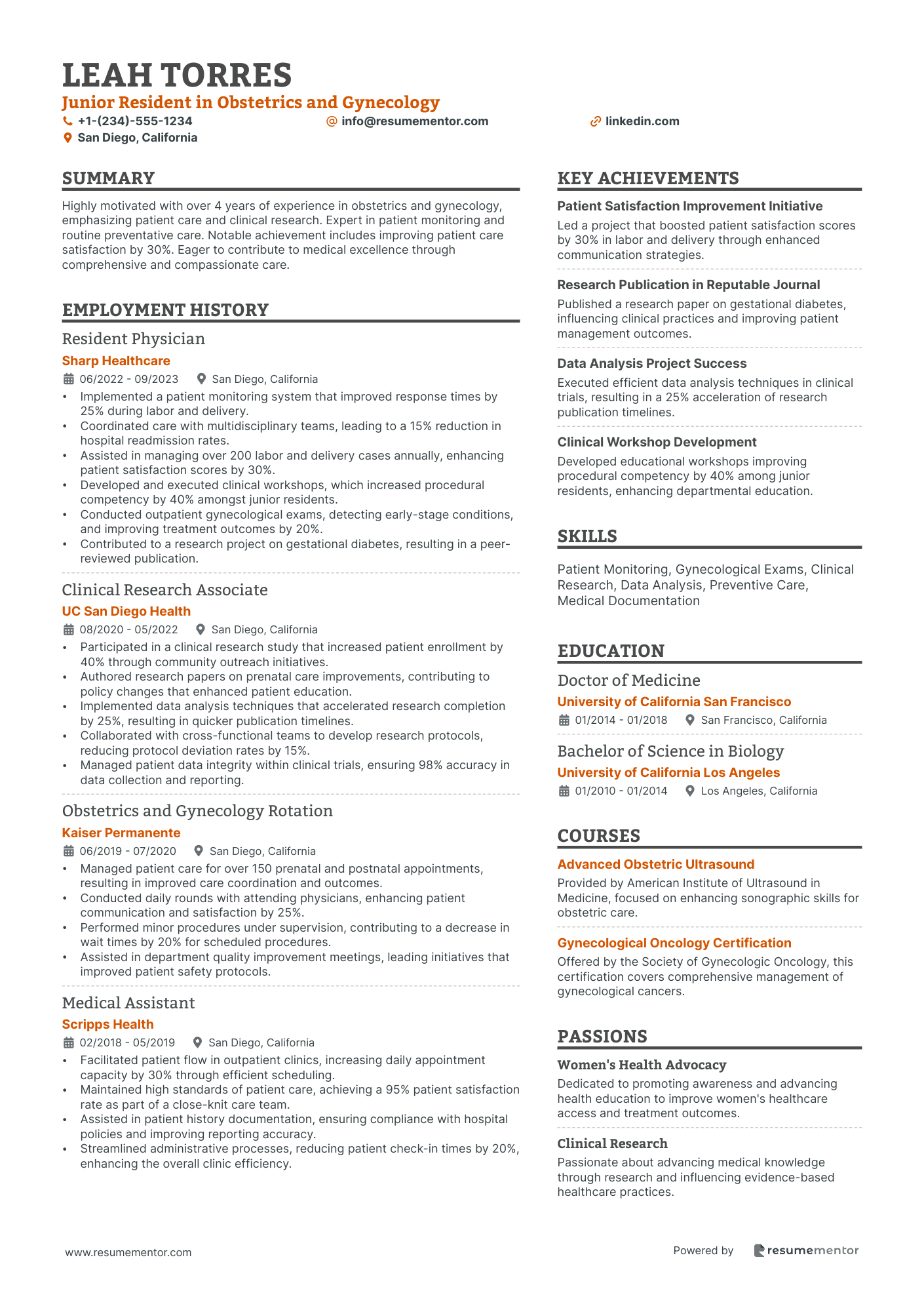
Junior Resident in Obstetrics and Gynecology
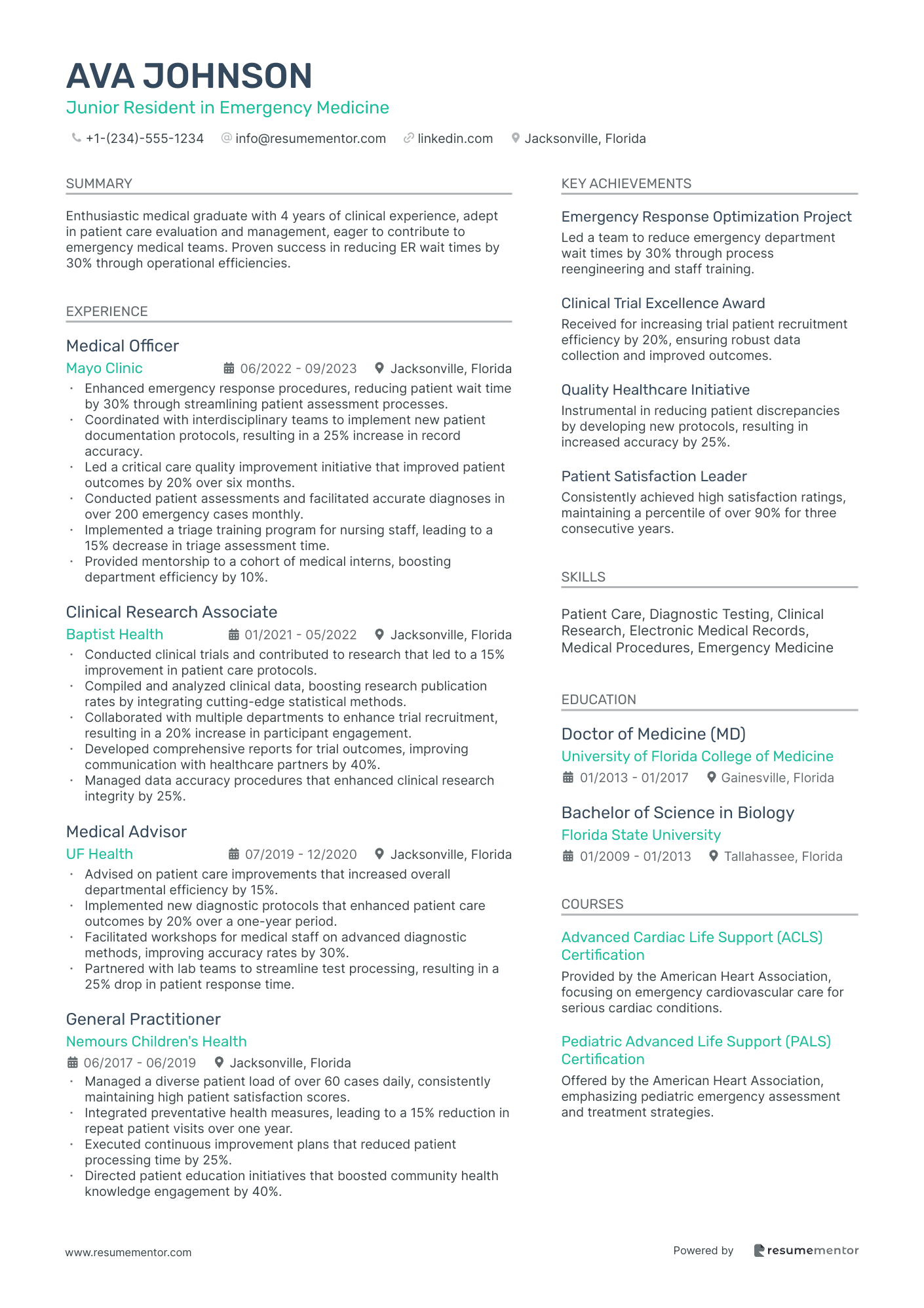
Junior Resident in Emergency Medicine
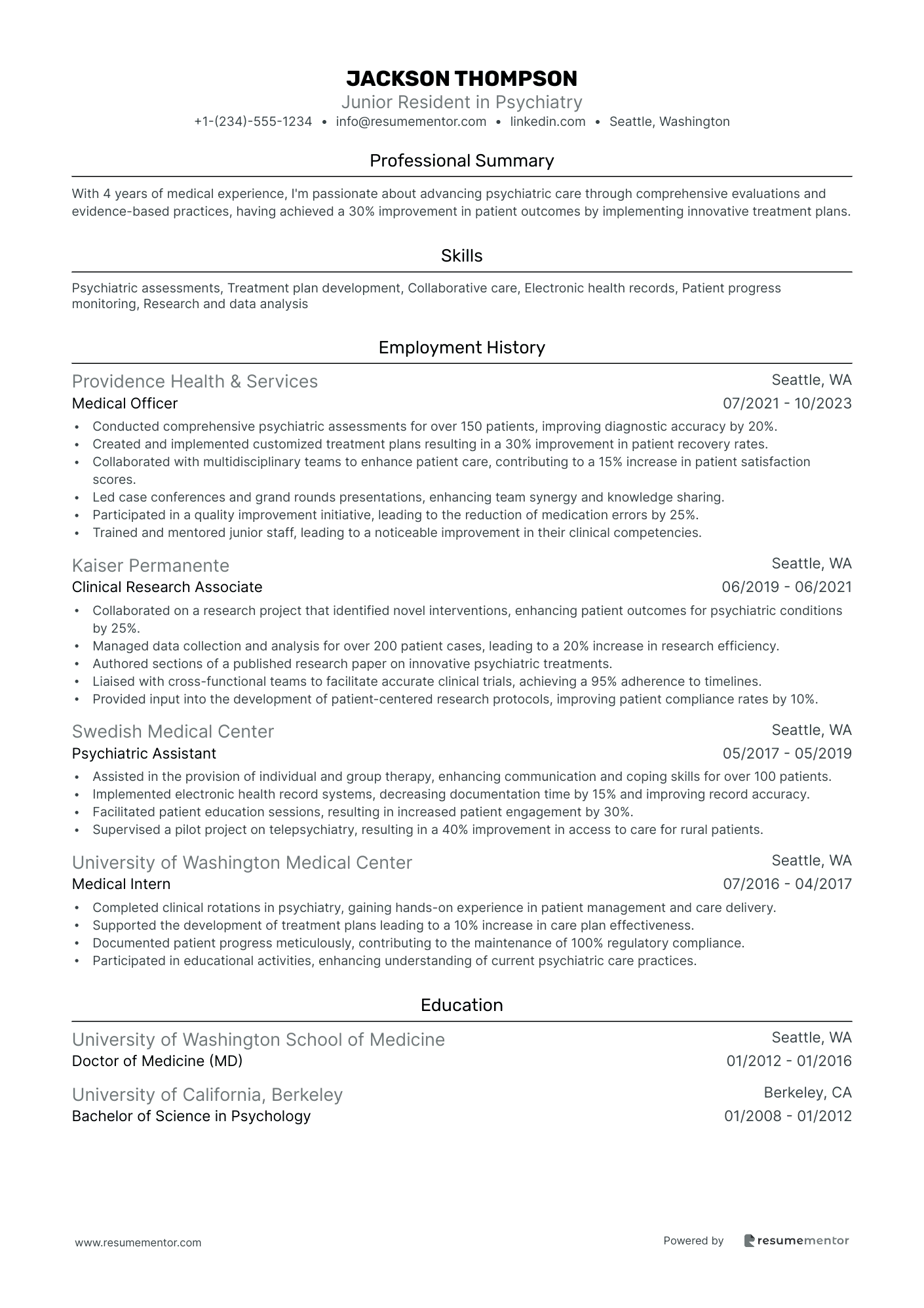
Junior Resident in Psychiatry
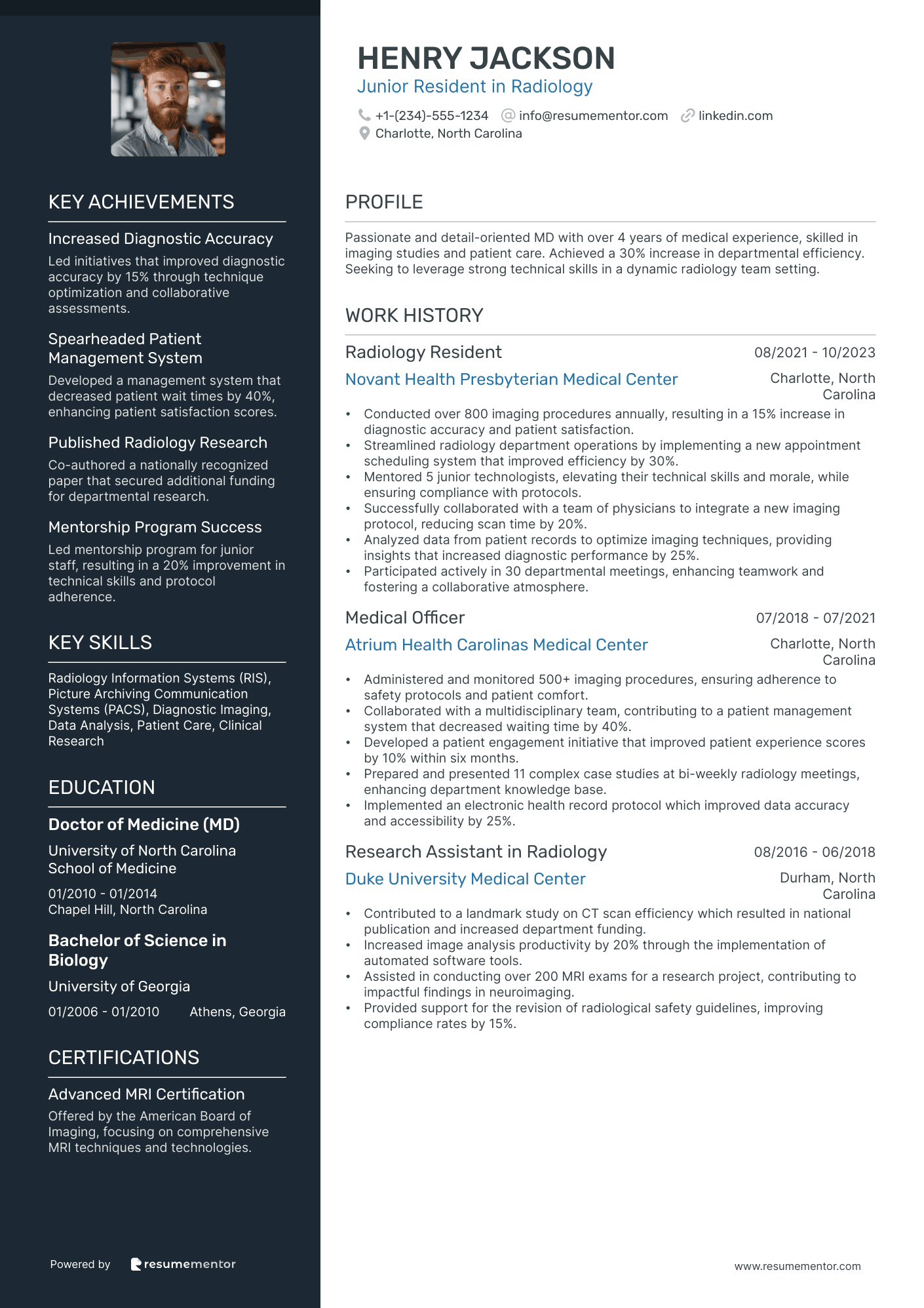
Junior Resident in Radiology
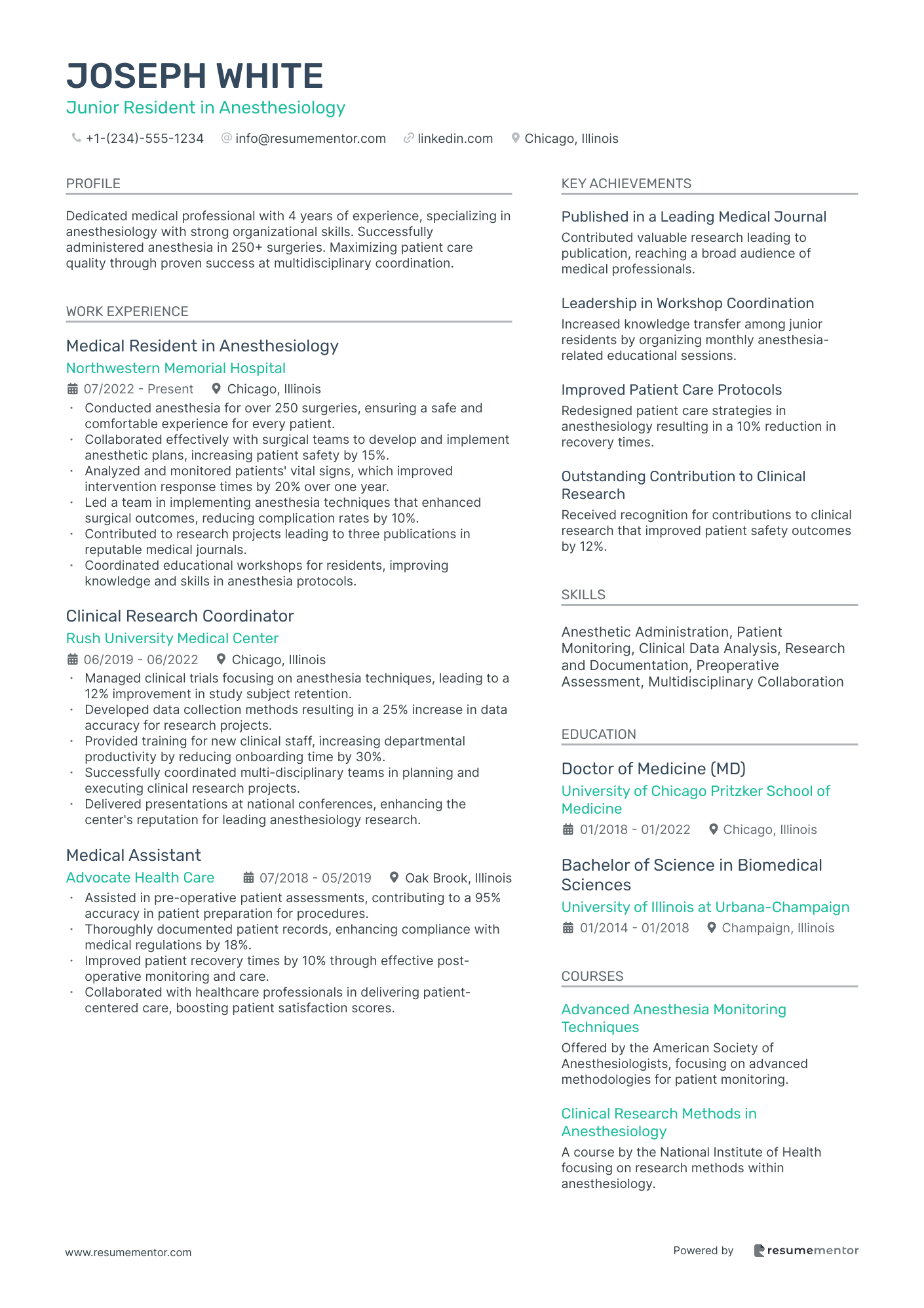
Junior Resident in Anesthesiology
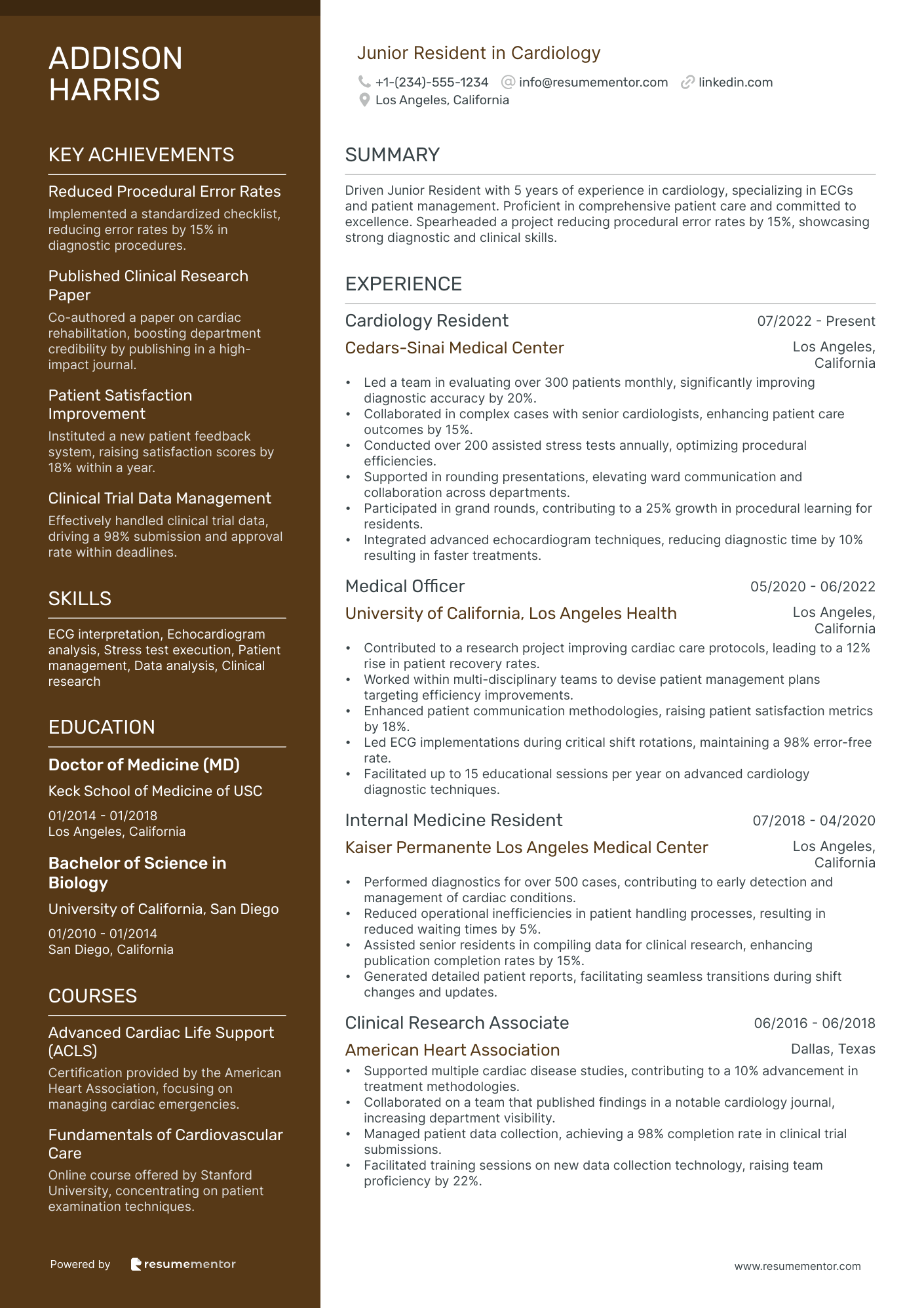
Junior Resident in Cardiology
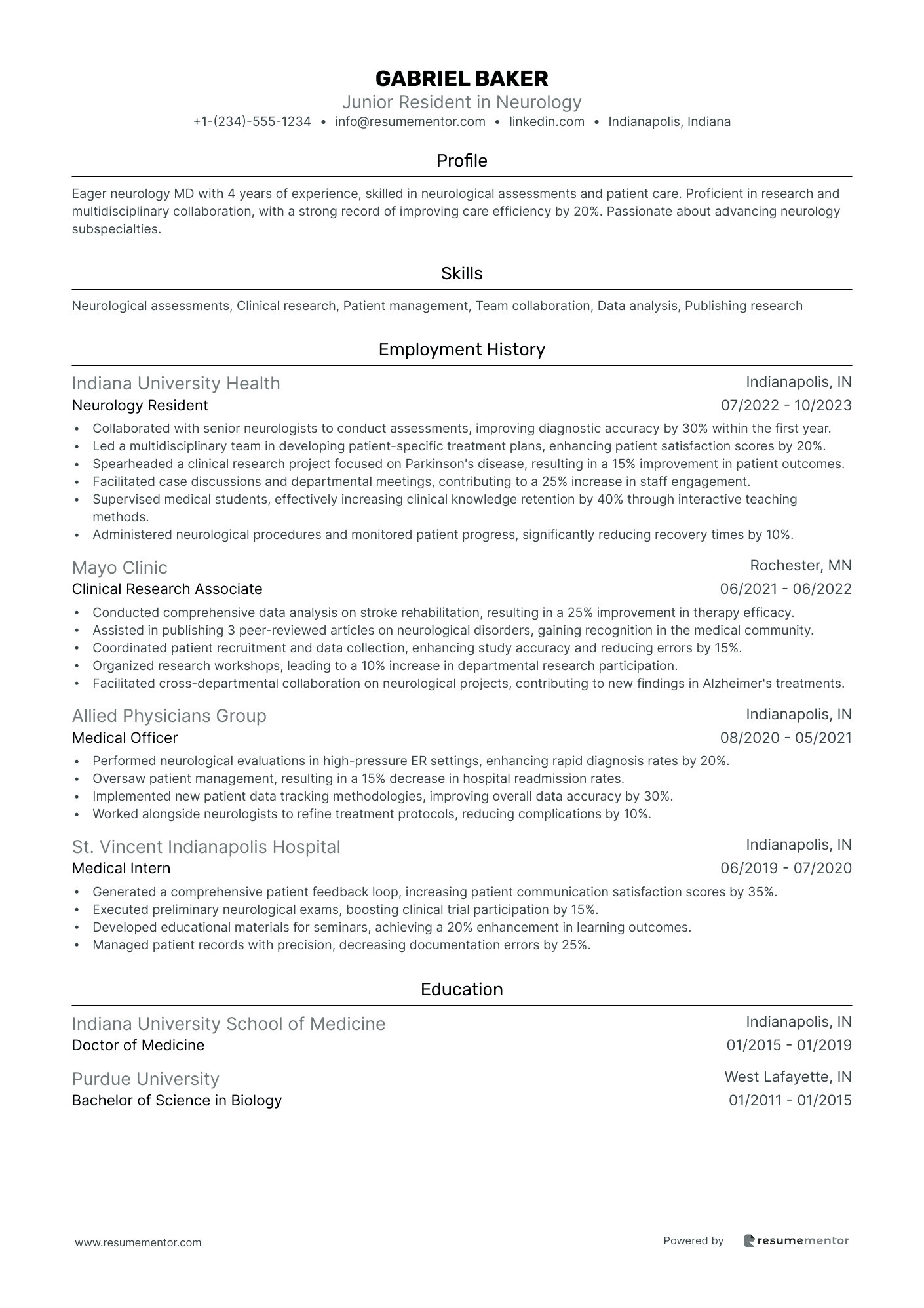
Junior Resident in Neurology
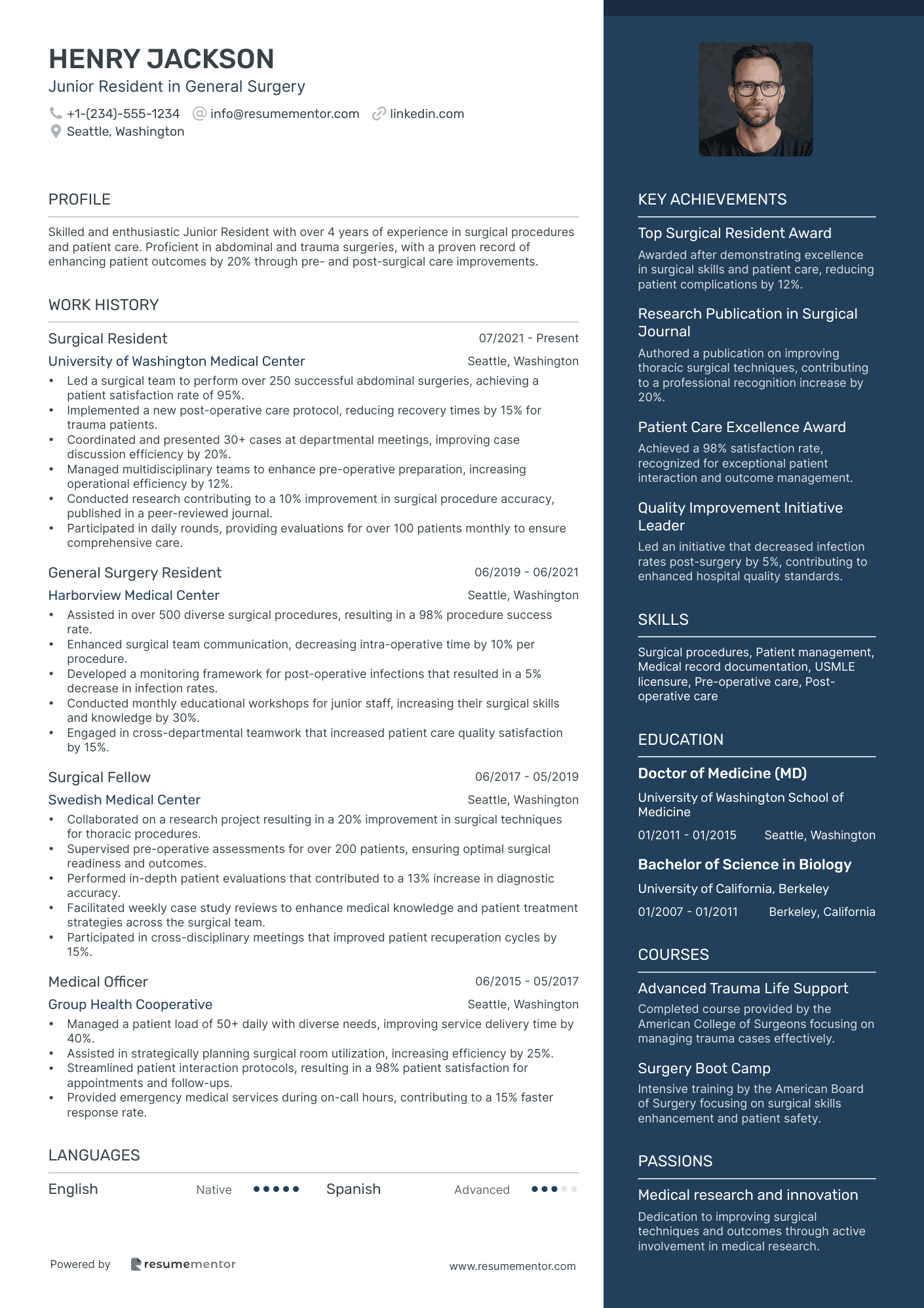
Junior Resident in General Surgery

Junior Resident in Pediatrics resume sample
- •Enhanced patient satisfaction by 25% in outpatient services through improved process efficiencies and personalized care.
- •Conducted physical examinations and systematically documented patient histories, improving record accuracy by 15%.
- •Led a team in a research project on pediatric respiratory conditions, increasing treatment success by 10%.
- •Participated in interdisciplinary team discussions to facilitate comprehensive approaches to patient care, increasing collaborative efficiency by 30%.
- •Assisted in over 50 case presentations, contributing valuable insights that streamlined treatment planning.
- •Developed educational materials for families, which reduced queries by 40% and improved understanding.
- •Assessed and diagnosed 100+ pediatric cases per month with a consistent accuracy rate of 95%.
- •Collaborated with specialists and nursing staff to enhance patient care, leading to a 15% improvement in treatment outcomes.
- •Developed a workshop series for medical staff, resulting in a 20% increase in procedural efficiency.
- •Co-authored research papers on pediatric immunology, contributing to a 5% improvement in hospital guidelines.
- •Initiated and implemented a patient follow-up program that reduced readmission rates by 10%.
- •Coordinated research projects on pediatric nutrition, leading to a 12% improvement in patient diet plans.
- •Engaged in grant writing activities, securing $50,000 in funding for department research projects.
- •Facilitated workshops on new research findings, increasing staff engagement and knowledge gain by 15%.
- •Monitored research trials compliance, ensuring 100% alignment with federal and institutional regulations.
- •Managed daily patient care for over 30 patients, consistently receiving positive feedback scores from families.
- •Implemented new patient assessment procedures that reduced wait times by 20%.
- •Participated in daily rounds and contributed to treatment decision-making with a 15% success rate increase.
- •Supported development of a patient education program, which increased family participation by 25%.
Junior Resident in Orthopedics resume sample
- •Led a team that improved surgical outcomes by 20% through adopting new surgical techniques for knee replacements.
- •Collaborated with a multidisciplinary team to reduce recovery time for patients by 15% resulting in shorter hospital stays.
- •Conducted patient evaluations and tailored treatment plans to increase patient satisfaction scores by 25%.
- •Performed over 200 minor procedures independently, resulting in a 95% success rate with minimal complications.
- •Attended regular workshops and departmental meetings, enhancing clinical skills and knowledge of orthopedic advancements.
- •Mentored 15 medical students and interns, fostering a supportive learning environment and improving their clinical performance.
- •Assisted in over 150 major orthopedic surgeries, contributing to a 97% success rate due to precise execution of joint replacements.
- •Enhanced patient care quality by improving the documentation process, leading to a 30% reduction in medical errors.
- •Participated in pioneering research on new orthopedic implants, resulting in publication in a renowned medical journal.
- •Successfully implemented an electronic health record (EHR) system upgrade, improving department efficiency by 20%.
- •Facilitated weekly educational conferences increasing departmental knowledge on novel treatment methodologies.
- •Managed clinical trials focused on orthopedic therapies, achieving patient recruitment goals by 150% through strategic outreach.
- •Analyzed data from orthopedics research, contributing to a 40% increase in research efforts and subsequent articles published.
- •Coordinated the research team meetings and tasks, boosting overall productivity and achieving project milestones on time.
- •Spearheaded a cross-functional project that streamlined data collection processes, reducing errors by 45%.
- •Delivered exceptional patient care in emergency and outpatient settings, leading to a 92% patient satisfaction rate.
- •Improved departmental protocols enhancing patient throughput by 25%, minimizing waiting time efficiently.
- •Conducted health education workshops with follow-up, resulting in 85% increased patient engagement in treatment.
- •Collaborated with attending physicians to develop treatment plans, significantly reducing readmission rates.
Junior Resident in Obstetrics and Gynecology resume sample
- •Implemented a patient monitoring system that improved response times by 25% during labor and delivery.
- •Coordinated care with multidisciplinary teams, leading to a 15% reduction in hospital readmission rates.
- •Assisted in managing over 200 labor and delivery cases annually, enhancing patient satisfaction scores by 30%.
- •Developed and executed clinical workshops, which increased procedural competency by 40% amongst junior residents.
- •Conducted outpatient gynecological exams, detecting early-stage conditions, and improving treatment outcomes by 20%.
- •Contributed to a research project on gestational diabetes, resulting in a peer-reviewed publication.
- •Participated in a clinical research study that increased patient enrollment by 40% through community outreach initiatives.
- •Authored research papers on prenatal care improvements, contributing to policy changes that enhanced patient education.
- •Implemented data analysis techniques that accelerated research completion by 25%, resulting in quicker publication timelines.
- •Collaborated with cross-functional teams to develop research protocols, reducing protocol deviation rates by 15%.
- •Managed patient data integrity within clinical trials, ensuring 98% accuracy in data collection and reporting.
- •Managed patient care for over 150 prenatal and postnatal appointments, resulting in improved care coordination and outcomes.
- •Conducted daily rounds with attending physicians, enhancing patient communication and satisfaction by 25%.
- •Performed minor procedures under supervision, contributing to a decrease in wait times by 20% for scheduled procedures.
- •Assisted in department quality improvement meetings, leading initiatives that improved patient safety protocols.
- •Facilitated patient flow in outpatient clinics, increasing daily appointment capacity by 30% through efficient scheduling.
- •Maintained high standards of patient care, achieving a 95% patient satisfaction rate as part of a close-knit care team.
- •Assisted in patient history documentation, ensuring compliance with hospital policies and improving reporting accuracy.
- •Streamlined administrative processes, reducing patient check-in times by 20%, enhancing the overall clinic efficiency.
Junior Resident in Emergency Medicine resume sample
- •Enhanced emergency response procedures, reducing patient wait time by 30% through streamlining patient assessment processes.
- •Coordinated with interdisciplinary teams to implement new patient documentation protocols, resulting in a 25% increase in record accuracy.
- •Led a critical care quality improvement initiative that improved patient outcomes by 20% over six months.
- •Conducted patient assessments and facilitated accurate diagnoses in over 200 emergency cases monthly.
- •Implemented a triage training program for nursing staff, leading to a 15% decrease in triage assessment time.
- •Provided mentorship to a cohort of medical interns, boosting department efficiency by 10%.
- •Conducted clinical trials and contributed to research that led to a 15% improvement in patient care protocols.
- •Compiled and analyzed clinical data, boosting research publication rates by integrating cutting-edge statistical methods.
- •Collaborated with multiple departments to enhance trial recruitment, resulting in a 20% increase in participant engagement.
- •Developed comprehensive reports for trial outcomes, improving communication with healthcare partners by 40%.
- •Managed data accuracy procedures that enhanced clinical research integrity by 25%.
- •Advised on patient care improvements that increased overall departmental efficiency by 15%.
- •Implemented new diagnostic protocols that enhanced patient care outcomes by 20% over a one-year period.
- •Facilitated workshops for medical staff on advanced diagnostic methods, improving accuracy rates by 30%.
- •Partnered with lab teams to streamline test processing, resulting in a 25% drop in patient response time.
- •Managed a diverse patient load of over 60 cases daily, consistently maintaining high patient satisfaction scores.
- •Integrated preventative health measures, leading to a 15% reduction in repeat patient visits over one year.
- •Executed continuous improvement plans that reduced patient processing time by 25%.
- •Directed patient education initiatives that boosted community health knowledge engagement by 40%.
Junior Resident in Psychiatry resume sample
- •Conducted comprehensive psychiatric assessments for over 150 patients, improving diagnostic accuracy by 20%.
- •Created and implemented customized treatment plans resulting in a 30% improvement in patient recovery rates.
- •Collaborated with multidisciplinary teams to enhance patient care, contributing to a 15% increase in patient satisfaction scores.
- •Led case conferences and grand rounds presentations, enhancing team synergy and knowledge sharing.
- •Participated in a quality improvement initiative, leading to the reduction of medication errors by 25%.
- •Trained and mentored junior staff, leading to a noticeable improvement in their clinical competencies.
- •Collaborated on a research project that identified novel interventions, enhancing patient outcomes for psychiatric conditions by 25%.
- •Managed data collection and analysis for over 200 patient cases, leading to a 20% increase in research efficiency.
- •Authored sections of a published research paper on innovative psychiatric treatments.
- •Liaised with cross-functional teams to facilitate accurate clinical trials, achieving a 95% adherence to timelines.
- •Provided input into the development of patient-centered research protocols, improving patient compliance rates by 10%.
- •Assisted in the provision of individual and group therapy, enhancing communication and coping skills for over 100 patients.
- •Implemented electronic health record systems, decreasing documentation time by 15% and improving record accuracy.
- •Facilitated patient education sessions, resulting in increased patient engagement by 30%.
- •Supervised a pilot project on telepsychiatry, resulting in a 40% improvement in access to care for rural patients.
- •Completed clinical rotations in psychiatry, gaining hands-on experience in patient management and care delivery.
- •Supported the development of treatment plans leading to a 10% increase in care plan effectiveness.
- •Documented patient progress meticulously, contributing to the maintenance of 100% regulatory compliance.
- •Participated in educational activities, enhancing understanding of current psychiatric care practices.
Junior Resident in Radiology resume sample
- •Conducted over 800 imaging procedures annually, resulting in a 15% increase in diagnostic accuracy and patient satisfaction.
- •Streamlined radiology department operations by implementing a new appointment scheduling system that improved efficiency by 30%.
- •Mentored 5 junior technologists, elevating their technical skills and morale, while ensuring compliance with protocols.
- •Successfully collaborated with a team of physicians to integrate a new imaging protocol, reducing scan time by 20%.
- •Analyzed data from patient records to optimize imaging techniques, providing insights that increased diagnostic performance by 25%.
- •Participated actively in 30 departmental meetings, enhancing teamwork and fostering a collaborative atmosphere.
- •Administered and monitored 500+ imaging procedures, ensuring adherence to safety protocols and patient comfort.
- •Collaborated with a multidisciplinary team, contributing to a patient management system that decreased waiting time by 40%.
- •Developed a patient engagement initiative that improved patient experience scores by 10% within six months.
- •Prepared and presented 11 complex case studies at bi-weekly radiology meetings, enhancing department knowledge base.
- •Implemented an electronic health record protocol which improved data accuracy and accessibility by 25%.
- •Contributed to a landmark study on CT scan efficiency which resulted in national publication and increased department funding.
- •Increased image analysis productivity by 20% through the implementation of automated software tools.
- •Assisted in conducting over 200 MRI exams for a research project, contributing to impactful findings in neuroimaging.
- •Provided support for the revision of radiological safety guidelines, improving compliance rates by 15%.
- •Managed a multidisciplinary research team to execute a project that enhanced imaging protocol efficiency by 25%.
- •Co-authored a research paper on non-invasive imaging techniques that increased department leadership credibility.
- •Coordinated 5 major research studies, successfully recruiting over 400 participants and maintaining compliance with all regulatory bodies.
- •Organized a series of workshops that trained 30 medical staff in cutting-edge radiology techniques.
Junior Resident in Anesthesiology resume sample
- •Conducted anesthesia for over 250 surgeries, ensuring a safe and comfortable experience for every patient.
- •Collaborated effectively with surgical teams to develop and implement anesthetic plans, increasing patient safety by 15%.
- •Analyzed and monitored patients' vital signs, which improved intervention response times by 20% over one year.
- •Led a team in implementing anesthesia techniques that enhanced surgical outcomes, reducing complication rates by 10%.
- •Contributed to research projects leading to three publications in reputable medical journals.
- •Coordinated educational workshops for residents, improving knowledge and skills in anesthesia protocols.
- •Managed clinical trials focusing on anesthesia techniques, leading to a 12% improvement in study subject retention.
- •Developed data collection methods resulting in a 25% increase in data accuracy for research projects.
- •Provided training for new clinical staff, increasing departmental productivity by reducing onboarding time by 30%.
- •Successfully coordinated multi-disciplinary teams in planning and executing clinical research projects.
- •Delivered presentations at national conferences, enhancing the center's reputation for leading anesthesiology research.
- •Assisted in pre-operative patient assessments, contributing to a 95% accuracy in patient preparation for procedures.
- •Thoroughly documented patient records, enhancing compliance with medical regulations by 18%.
- •Improved patient recovery times by 10% through effective post-operative monitoring and care.
- •Collaborated with healthcare professionals in delivering patient-centered care, boosting patient satisfaction scores.
- •Supported research on anesthetic drugs, improving research data validity by 20%.
- •Assisted in developing protocols for anesthetic studies, enhancing efficiency in data collection.
- •Prepared reports on research findings that facilitated informed decisions for senior researchers.
- •Contributed to the improvement of research methodologies resulting in higher accuracy of clinical studies.
Junior Resident in Cardiology resume sample
- •Led a team in evaluating over 300 patients monthly, significantly improving diagnostic accuracy by 20%.
- •Collaborated in complex cases with senior cardiologists, enhancing patient care outcomes by 15%.
- •Conducted over 200 assisted stress tests annually, optimizing procedural efficiencies.
- •Supported in rounding presentations, elevating ward communication and collaboration across departments.
- •Participated in grand rounds, contributing to a 25% growth in procedural learning for residents.
- •Integrated advanced echocardiogram techniques, reducing diagnostic time by 10% resulting in faster treatments.
- •Contributed to a research project improving cardiac care protocols, leading to a 12% rise in patient recovery rates.
- •Worked within multi-disciplinary teams to devise patient management plans targeting efficiency improvements.
- •Enhanced patient communication methodologies, raising patient satisfaction metrics by 18%.
- •Led ECG implementations during critical shift rotations, maintaining a 98% error-free rate.
- •Facilitated up to 15 educational sessions per year on advanced cardiology diagnostic techniques.
- •Performed diagnostics for over 500 cases, contributing to early detection and management of cardiac conditions.
- •Reduced operational inefficiencies in patient handling processes, resulting in reduced waiting times by 5%.
- •Assisted senior residents in compiling data for clinical research, enhancing publication completion rates by 15%.
- •Generated detailed patient reports, facilitating seamless transitions during shift changes and updates.
- •Supported multiple cardiac disease studies, contributing to a 10% advancement in treatment methodologies.
- •Collaborated on a team that published findings in a notable cardiology journal, increasing department visibility.
- •Managed patient data collection, achieving a 98% completion rate in clinical trial submissions.
- •Facilitated training sessions on new data collection technology, raising team proficiency by 22%.
Junior Resident in Neurology resume sample
- •Collaborated with senior neurologists to conduct assessments, improving diagnostic accuracy by 30% within the first year.
- •Led a multidisciplinary team in developing patient-specific treatment plans, enhancing patient satisfaction scores by 20%.
- •Spearheaded a clinical research project focused on Parkinson's disease, resulting in a 15% improvement in patient outcomes.
- •Facilitated case discussions and departmental meetings, contributing to a 25% increase in staff engagement.
- •Supervised medical students, effectively increasing clinical knowledge retention by 40% through interactive teaching methods.
- •Administered neurological procedures and monitored patient progress, significantly reducing recovery times by 10%.
- •Conducted comprehensive data analysis on stroke rehabilitation, resulting in a 25% improvement in therapy efficacy.
- •Assisted in publishing 3 peer-reviewed articles on neurological disorders, gaining recognition in the medical community.
- •Coordinated patient recruitment and data collection, enhancing study accuracy and reducing errors by 15%.
- •Organized research workshops, leading to a 10% increase in departmental research participation.
- •Facilitated cross-departmental collaboration on neurological projects, contributing to new findings in Alzheimer's treatments.
- •Performed neurological evaluations in high-pressure ER settings, enhancing rapid diagnosis rates by 20%.
- •Oversaw patient management, resulting in a 15% decrease in hospital readmission rates.
- •Implemented new patient data tracking methodologies, improving overall data accuracy by 30%.
- •Worked alongside neurologists to refine treatment protocols, reducing complications by 10%.
- •Generated a comprehensive patient feedback loop, increasing patient communication satisfaction scores by 35%.
- •Executed preliminary neurological exams, boosting clinical trial participation by 15%.
- •Developed educational materials for seminars, achieving a 20% enhancement in learning outcomes.
- •Managed patient records with precision, decreasing documentation errors by 25%.
Junior Resident in General Surgery resume sample
- •Led a surgical team to perform over 250 successful abdominal surgeries, achieving a patient satisfaction rate of 95%.
- •Implemented a new post-operative care protocol, reducing recovery times by 15% for trauma patients.
- •Coordinated and presented 30+ cases at departmental meetings, improving case discussion efficiency by 20%.
- •Managed multidisciplinary teams to enhance pre-operative preparation, increasing operational efficiency by 12%.
- •Conducted research contributing to a 10% improvement in surgical procedure accuracy, published in a peer-reviewed journal.
- •Participated in daily rounds, providing evaluations for over 100 patients monthly to ensure comprehensive care.
- •Assisted in over 500 diverse surgical procedures, resulting in a 98% procedure success rate.
- •Enhanced surgical team communication, decreasing intra-operative time by 10% per procedure.
- •Developed a monitoring framework for post-operative infections that resulted in a 5% decrease in infection rates.
- •Conducted monthly educational workshops for junior staff, increasing their surgical skills and knowledge by 30%.
- •Engaged in cross-departmental teamwork that increased patient care quality satisfaction by 15%.
- •Collaborated on a research project resulting in a 20% improvement in surgical techniques for thoracic procedures.
- •Supervised pre-operative assessments for over 200 patients, ensuring optimal surgical readiness and outcomes.
- •Performed in-depth patient evaluations that contributed to a 13% increase in diagnostic accuracy.
- •Facilitated weekly case study reviews to enhance medical knowledge and patient treatment strategies across the surgical team.
- •Participated in cross-disciplinary meetings that improved patient recuperation cycles by 15%.
- •Managed a patient load of 50+ daily with diverse needs, improving service delivery time by 40%.
- •Assisted in strategically planning surgical room utilization, increasing efficiency by 25%.
- •Streamlined patient interaction protocols, resulting in a 98% patient satisfaction for appointments and follow-ups.
- •Provided emergency medical services during on-call hours, contributing to a 15% faster response rate.
Crafting a junior resident resume is like building a bridge to your future career, crucial for grabbing opportunities and standing out. It can feel daunting to present your accomplishments and medical expertise clearly, but it's essential for making a strong impression.
As a junior resident, you might struggle with highlighting the right experiences and translating your clinical skills into language hiring managers will appreciate. That's where using a resume template can make a difference, helping you structure your information effectively within industry standards. For some helpful options, you can explore these resume templates.
A well-crafted resume does more than list your skills; it tells the story of your journey. By focusing on clarity and brevity, you can navigate a competitive job market and set a positive tone for your career path. Highlighting your passion for healthcare ensures that your resume resonates with potential employers.
Underscore your technical precision and support your qualifications with examples or data to build a compelling narrative. Keeping your language clear and direct will make every word count. With the right approach and tools, your resume becomes a personal career blueprint, paving the way for success.
Key Takeaways
- A well-crafted resume is vital for standing out in the competitive job market, highlighting not just skills but the candidate's journey and passion for healthcare.
- Start by organizing contact details, an objective statement, education, clinical experience, skills, and certifications to create a professional image aligned with job requirements.
- Utilize strong action verbs and quantifiable achievements in bullet points to effectively communicate past roles and impact, focusing on skills pertinent to the medical field.
- Choose a chronological format to clearly depict career progression and use modern, readable fonts for a professional appearance, saving the document as a PDF to maintain consistency.
- Include both hard and soft skills such as medical procedures and teamwork, using them as keywords to increase visibility and appeal to potential employers.
What to focus on when writing your junior resident resume
Creating a junior resident resume lets you highlight your medical expertise and demonstrate your readiness to contribute in healthcare environments. It's essential that recruiters quickly see your medical knowledge, your dedication to patient care, and how your education aligns with the role you're aiming for.
How to structure your junior resident resume
- Contact Information — Begin with your name, phone number, email, and LinkedIn profile at the top. These details are your first impression, so ensure they're up-to-date and easy to find. Having a professional email address and LinkedIn profile that matches your resume can help create a cohesive image for you. Your LinkedIn profile should highlight relevant experiences that back up what you mention in your resume.
- Objective Statement — This short section should clearly state your career goals and explain what draws you to the junior resident position. Tailoring it to each job application makes a strong impact. Mention specific aspects of the residency program or how it aligns with your long-term career objectives, showing that you’ve researched the role and thought critically about your goals.
- Education — Following your objective, list your medical school, degree, and graduation date. Highlighting relevant courses, honors, or projects here can showcase your commitment and skills in medicine. Consider adding any specialized training or certifications gained during medical school that relate directly to the residency program you're entering.
- Clinical Experience — Next, describe your rotations, internships, or patient interactions. Focus on the skills applied during these experiences and their outcomes, like improved patient care or successful teamwork. Providing concrete examples of challenges you've faced and how you resolved them can offer a clear view of your practical abilities and problem-solving skills.
- Skills — This section builds on your clinical experience by listing your medical expertise, such as patient care, diagnostic skills, or proficiency with electronic medical records. Including soft skills like communication and teamwork is also crucial, as they complement your technical abilities in healthcare settings. Emphasizing skills that are specifically requested in the job posting can underline your suitability for the position.
- Certifications and Licenses — Finish with any relevant medical licenses or certifications, such as USMLE Step scores or other credentials. These demonstrate your qualifications and readiness to take on a junior resident role. Mentioning certifications that highlight your continued commitment to learning and advancement in your field can add significant value to your application.
Optional sections like Volunteer Experience, Publications, or Professional Affiliations can further round out your resume, giving recruiters a fuller picture of your background and interests in the medical field. Now, let's delve into each of these sections in more detail to ensure your resume format effectively showcases your qualifications for a junior resident position.
Which resume format to choose
Crafting an effective junior resident resume involves carefully selecting a format that emphasizes your qualifications. A chronological layout is particularly effective in this field because it clearly outlines your education, certifications, and hands-on experience. This structured format enables recruiters to quickly understand your career progression and suitability for the role.
Once you've settled on the format, choosing the right font is crucial for maintaining professionalism. Fonts like Raleway, Lato, and Montserrat offer a modern touch, enhancing the readability of your resume without overwhelming the content. These fonts provide a contemporary look that aligns well with the healthcare industry's emphasis on clarity and precision.
The next step is to consider the file type when sharing your resume. Saving and sending your resume as a PDF is essential. This format prevents formatting issues and ensures that what you've created looks the same on every device. Consistency is key in making a professional first impression, and a PDF guarantees that your resume appears as polished as you intended.
Finally, don’t overlook the importance of proper margins. Stick to one-inch margins on all sides to maintain a clean and accessible layout. Adequate spacing makes your content more inviting and easier to read, allowing hiring managers to focus on your accomplishments and skills without distraction. This attention to detail reflects the diligence and thoroughness expected in a junior resident role.
How to write a quantifiable resume experience section
Creating an impressive junior resident resume experience section means making your past roles resonate with your future goals. Start by organizing your experiences in reverse chronological order, which ensures your most recent work is highlighted. Focus on roles related to the medical field, especially those involving patient care, teamwork, and technical skills, as these are crucial for a residency. When listing job titles, ensure they are relevant to residency or at least touch on medical experience, and tailor your entries by reflecting the job ad's language and keywords. This helps your resume align with the employer's needs. Using strong action verbs like "managed," "led," "improved," and "achieved" helps illustrate your accomplishments effectively.
Limit yourself to experiences from the last 10-15 years and highlight measurable achievements to demonstrate your impact. Tailoring your resume means letting the job description guide which experiences to emphasize, making this section a vital tool to showcase your fit for the role and your track record of success.
- •Managed a daily patient caseload of 20+ with a 95% satisfaction rate.
- •Led a team of 5 interns, boosting departmental efficiency by 30%.
- •Implemented a new patient tracking system, shaving check-in time by 15%.
- •Conducted clinical research that upped treatment accuracy by 10%.
This experience section effectively connects each of your achievements to the junior resident role, making them directly relevant. By using quantifiable achievements, your contributions become not only clear but also impactful, demonstrating your value in concrete terms. The layout provides a clean view, allowing hiring managers to grasp your successful past quickly. Each bullet emphasizes skills critical in patient care and teamwork, making your experience a compelling highlight of your resume. This focus on improvement and efficiency underscores the priorities in healthcare, ensuring your experience aligns well with the expectations of potential employers.
Innovation-Focused resume experience section
A junior resident-focused resume experience section should present how your creativity and problem-solving skills drove innovation in your role. Begin by recalling projects or tasks where you helped introduce or develop new ideas or technologies. Clearly describe what you contributed and the positive outcomes that followed. This approach highlights your eagerness to explore new possibilities and demonstrates your proactive approach.
When describing your accomplishments, use simple, direct language to effectively convey your innovative spirit. Strong action verbs like “initiated,” “developed,” or “enhanced” help showcase your achievements. By focusing on how your efforts improved processes or delivered fresh solutions, you provide a clear picture of your impact. Contextualize each project and its results, ensuring each bullet point remains concise and centered on your contributions and their innovative benefits.
Junior Resident
Greenwich Medical Center
June 2022 - August 2023
- Led a team to brainstorm new methods for streamlining patient data entry, reducing time by 30%.
- Developed a digital tool that automated appointment scheduling, increasing efficiency.
- Implemented a pilot program introducing telemedicine options, enhancing patient reach.
- Coordinated workshops for staff to foster a culture of innovation and continuous improvement.
Project-Focused resume experience section
A project-focused junior resident resume experience section should emphasize specific projects and the achievements within them. Highlight how your contributions positively affected the team or organization. Through bullet points, clearly articulate your accomplishments, beginning each with an action verb to demonstrate your actions and achievements. It's important to also show how these projects contributed to your learning and development. To effectively convey your skills, maintain clear and straightforward language throughout.
Start by noting the time frame of your involvement and follow it with a title that summarizes your role. Mention your job title and workplace to establish context for your activities. Use bullet points to detail various aspects of your projects, focusing on the actions you took and the skills you applied or honed. Ensure that each point underscores your involvement and the results you achieved. This section should not only showcase your technical capabilities but also highlight how you leveraged skills like communication and problem-solving in these projects.
Junior Resident
City Health Institute
June 2021 - August 2021
- Led a team of three to design and implement a community health survey, reaching over 500 participants.
- Developed a database to efficiently store and analyze survey data, improving retrieval speed by 40%.
- Collaborated with senior staff to present findings to local health authorities, resulting in a $10,000 grant.
- Organized weekly meetings to track project progress and distribute tasks among team members.
Growth-Focused resume experience section
A growth-focused junior resident resume experience section should clearly show how you've contributed to an organization's development and improvement. Begin by stating the duration, your role, and where you were employed. Highlight significant contributions by using bullet points that focus on measurable impacts, using numbers or percentages when possible. By mentioning specific skills and tasks, you can illustrate the diversity of your responsibilities.
To maintain a strong connection between achievements, ensure each bullet ties back to the theme of growth or enhancement. Consider the initiatives you started, the projects you led, or the solutions you provided, always making sure these examples showcase your growth potential. Through specific achievements, you not only demonstrate your value but also reveal a willingness to learn and adapt for the benefit of your team and organization.
Intern
Local Community Center
June 2021 - August 2022
- Helped plan and execute three major community outreach programs, boosting participation by 25%.
- Worked with a team to redesign department workflows, resulting in a 15% increase in efficiency.
- Conducted research that supported acquiring two new partnerships through data compilation.
- Created a training program that improved new hire onboarding by 30%, earning recognition.
Customer-Focused resume experience section
A customer-focused junior resident resume experience section should clearly demonstrate your ability to engage and support customers effectively. Begin by focusing on the essential qualities employers seek in this role, such as strong communication skills, problem-solving abilities, and a friendly demeanor. To showcase your strengths, detail your contributions and achievements using action verbs to start each bullet point. Each entry should create a cohesive narrative of how you've positively interacted with and supported customers, emphasizing your capability to enhance their experience.
List the dates, your job title, and the workplace name to set the stage. Follow with bullet points that vividly illustrate your responsibilities and successes, especially highlighting moments when you excelled in customer service. Use specific examples, like resolving inquiries quickly or training new team members, to show your value. This approach effectively communicates your potential as a junior resident, making your resume stand out to employers.
Junior Customer Support
ABC Retail
June 2022 - Present
- Resolved 95% of customer inquiries on first contact by understanding needs and providing accurate information.
- Enhanced customer satisfaction by 20% through active listening and offering tailored solutions.
- Trained three new team members, focusing on effective communication and empathy in customer interactions.
- Streamlined the complaint resolution process, reducing response time by 30%.
Write your junior resident resume summary section
A skills-focused junior resident resume should highlight your strengths in a way that sets you apart from other candidates. At this stage in your career, focusing on your education, relevant skills, and hands-on experience from training is key. For instance:
This example shows your readiness to use what you've learned and emphasizes both your educational background and practical experience. A resume summary gives a quick snapshot of your qualifications, whereas a resume objective focuses on your goals for the role. These elements work together to create a cohesive picture.
If you prefer detailing your aspirations, an objective might express your desire to grow in a specific field. Meanwhile, a resume profile is similar to a summary, offering a broader view of your background. A summary of qualifications is more of a bulleted list of your top skills or achievements. Each option serves a purpose, making your resume unique. Choose the format that best highlights your current strengths. Clear and relevant details will make your resume shine.
Listing your junior resident skills on your resume
A skills-focused junior resident resume should clearly showcase your abilities, whether they stand alone or are integrated into your experience and summary sections. Highlighting strengths and soft skills helps differentiate you, showcasing qualities like communication, leadership, and adaptability. In contrast, hard skills are specific abilities you've learned, such as medical procedures or proficiency with medical software. Including both skills and strengths on your resume is crucial, as they serve as keywords, enhancing its visibility to employers.
Here's an example of a standalone skills section:
This skills section effectively emphasizes key abilities crucial for a junior resident position. Focusing on practical, everyday skills like Patient Care and Clinical Procedures demonstrates your capability to work directly with patients. Highlighting Time Management and Medical Documentation underscores your organizational skills, essential for handling workloads and maintaining accurate records. Including skills like Team Collaboration and Problem Solving suggests your capacity to work well with others and tackle challenges. Meanwhile, Electronic Medical Records and Acute Care point to your technical expertise and readiness for urgent medical situations.
Best hard skills to feature on your junior resident resume
As a junior resident, showcasing hard skills highlights your hands-on medical abilities and technical knowledge. These skills demonstrate your competence in executing clinical tasks and delivering quality patient care.
Hard Skills
- Patient Assessment
- CPR Certification
- Suturing Techniques
- Clinical Research
- Medical Record Keeping
- Medication Administration
- Phlebotomy
- Diagnosing Illnesses
- Infection Control
- EKG Interpretation
- Surgical Assistance
- Medical Coding and Billing
- Advanced Cardiac Life Support (ACLS)
- Proficiency with EMR software
- Understanding of HIPAA regulations
Best soft skills to feature on your junior resident resume
Highlighting soft skills as a junior resident illustrates your empathy, communication, and teamwork abilities. These skills demonstrate your emotional intelligence and capability to connect with others effectively.
Soft Skills
- Empathy
- Communication
- Team Collaboration
- Adaptability
- Problem Solving
- Stress Management
- Cultural Competence
- Active Listening
- Critical Thinking
- Patience
- Attention to Detail
- Leadership
- Conflict Resolution
- Emotional Resilience
- Decision Making
How to include your education on your resume
The education section of your junior resident resume is crucial because it showcases your academic background relevant to the job. Tailor this section to the role, omitting any irrelevant education. It informs the recruiter about the qualifications you acquired that make you suitable for a junior resident position. When listing your degree, spell out the full name, such as "Doctor of Medicine (MD)." If your GPA is above 3.5, you should include it, formatted like "GPA: 3.8/4.0," to highlight your academic excellence. Mention honors like "cum laude" to emphasize your achievements. This attention to detail can make a big difference. Below are examples of how to craft this section effectively.
The second example works well because it includes relevant medical education tailored for a junior resident position. It highlights the candidate's Doctor of Medicine degree from a prestigious institution. Including a high GPA and the location adds context and credibility to the resume. This detailed presentation shows the recruiter that you possess the necessary qualifications and achievements for the role.
In Conclusion
In conclusion, crafting a compelling junior resident resume is vital for setting the foundation of your medical career. It should not merely reflect your clinical skills but also narrate your career journey. Utilizing a well-structured template can help you present your experience and expertise effectively, making your resume stand out to potential employers. Highlighting both your accomplishments and your passion for healthcare will ensure that your application resonates. Remember to underscore your technical prowess with clear, measurable examples that showcase your contributions. Organizing your resume to include a precise overview of your education, skills, and clinical experiences makes for a comprehensive, cohesive job application. Being meticulous with format choices, from clean fonts to consistent margins, demonstrates professionalism and attention to detail—qualities highly valued in the medical field. Emphasizing both hard and soft skills shows a balance of technical knowledge and interpersonal abilities, essential for patient care. Lastly, choose the right type of resume summary that best reflects your strengths and aspirations, tying them to the potential role you desire. By doing so, you position yourself as a candidate who is well-prepared and eager for the challenges and opportunities that a junior resident position has to offer. Through these steps, your resume not only opens doors but also outlines a compelling image of your future in healthcare.
Related Articles

Continue Reading
Check more recommended readings to get the job of your dreams.
Resume
Resources
Tools
© 2026. All rights reserved.
Made with love by people who care.

